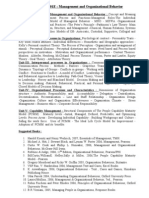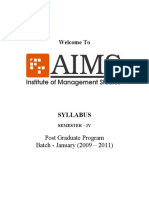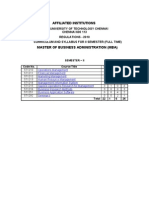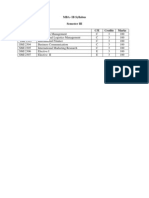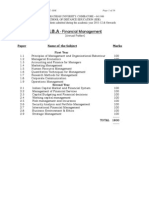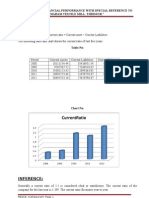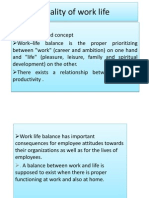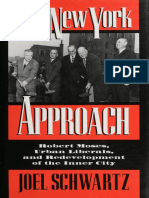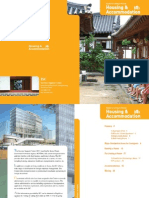Mba 4th Sem Syllabus
Mba 4th Sem Syllabus
Uploaded by
Riyas ParakkattilCopyright:
Available Formats
Mba 4th Sem Syllabus
Mba 4th Sem Syllabus
Uploaded by
Riyas ParakkattilOriginal Description:
Copyright
Available Formats
Share this document
Did you find this document useful?
Is this content inappropriate?
Copyright:
Available Formats
Mba 4th Sem Syllabus
Mba 4th Sem Syllabus
Uploaded by
Riyas ParakkattilCopyright:
Available Formats
UNIVERSITY OF CALICUT - MASTER OF BUSINESS ADMINISTRATION MBA 4.
1 COST AND QUALITY MANAGEMENT Time: 60 hrs Marks: 100 marks(4 credits)
Module I Need and importance of understanding cost managementrelevance of cost management in organizational success-various cost conceptselements of cost-types of cost materials cost accountinglabour cost accounting overhead cost accountingcosting methods and costing techniquesinstillation of a costing system cost centrecost unitpre requisites of a good costing system- unit costing and cost sheet-preparation of cost sheet. Module II Marginal costing and breakeven analysisCVP analysisapplication of marginal costing in managerial decisionsmake or buy decision-key factor decisionpricing decisionoptimum production capacity decisionproduct mix decisioninvestment decision Module III Management control systems--Budgetary controlbudget centrebudget committee and budget manual. Functional budget-cash budgetmaster budgetfixed and flexible budget zero based budget Standard costing and variance analysis material variance, labour variance and over head variancesales variance ( Only first level variances) causes and disposition of variances. Responsibility accountingcost centre, profit centre and investment centre Transfer pricing. Module IV Evolution of quality Management; concepts and objectives of quality management; Zero defects; Acceptance sampling; Quality inspection; Quality assurance; Quality circles; training for quality; concept and tools of Six Sigma. Statistical quality control: basic concepts; product control; process control; variations in quality; control charts; types of control charts- mean charts, range charts, Pchart, n p chart, C charts; Applications of control charts. (Numerical are not necessary) Module VI Total quality management: strategic quality planning; organising for TQM; Training for TQM; Kaizen; benchmarking; TQM in service organisations; Implementing TQM. Quality standards: ISO 9000; Quality systems under ISO 9000; ISO 14000; ISO Certification process; Quality awards: Baldrige Award; Demings Prize.
Books: 1. Juran, J.M.and Frank K Gryana: Quality Planning and Analysis, Tata McGraw Hill,Mumbai 1970. 2. Lock, Dennis: ed. Handbook of Quality management ;Jaico Publishing House, Mumbai1993. 3. Ramaswamy, Subburaj: Total Quality Management, Tata McGraw Hill, New Delhi 2005. 4. AmitavaMitra: Quality Control and Improvement, Pearson Education, New Delhi 2005. 5. Chandra, D, et el,: Quality Circles, Tata McGraw Hill, New Delhi 1991. 6. Ross, Joel E.: Total Quality Management, Vanity Books International, New Delhi 1996. 7. Evans, James R., et.el, The Management and Control of Quality , JaicoPublishingHouse, Mumbai1994. 8. Blocher and Chen: Cost ManagermentMcGraw Hill 9. Jain &Narang: Cost AccountingKalyani Publications
UNIVERSITY OF CALICUT MASTER OF BUSINESS ADMINISTRATION MBA 4.2 STRATEGIC MANAGEMENT Time: 60 hrs 4 Credits Module I Evolution of business policy and strategic management as a field of study.- nature and meaning of strategy- strategic planning tactical planning - characteristics of strategic decisions strategic management process benefits and relevance of strategic management growing relevance of strategic management in India. Module II Strategic formulation mission and purpose business definition Environmental appraisal - concept of environment environmental scanning-appraising the environment organizational appraisal strategic alternatives-classification of strategies strategic choice-process of strategic choice corporate portfolio analysis-industry, competitor, SWOT analysis-strategic plan. Module III Strategy Implementation-issue in strategy implementation-project implementation Procedural implementation-structural implementation-functional implementation behavioral implementation. Module IV Strategy Evaluation and Control-strategic control-operational control-technique of Strategic evaluation and control-essential features of effective evaluation and control preventive control contingency planning Module V Case discussions and analysis
References 1. William Glueck : Business policy Strategy formulation and management action 2. Rue : Strategic Management 3. Donal F Harvey: Business policy and Strategic Management. 4. R.M Srivasthava: Management policy and Strategic Management. 5. V.P Michael : Globalization, Liberalization and Strategic Management. 6. Francis Cherunilam: Business Policy and Strategic Management. 7. AzharKasmi : Business Policy 8. Bhattacharya : Strategic Management.
Finance Elective MASTER OF BUSINESS ADMINISTRATION MBA FIN 6 FINANCIAL SERVICES 60 Contact hours - 4 Credits Module I Indian financial system an overview. Money market call money market commercial paper market commercial bill market certificates of deposits treasury bill market gilt edged securities market. Capital market an overview - capital market instruments capital market reforms primary markets methods of raising funds from primary market- public issue global markets issue of American depository receipts and global depository receipts guide lines on their issue emerging trends. Module II Financial services- nature characteristics role of financial services in economic development relevance of the study of financial services factors influencing the growth and development of financial services industry types of financial services Module III Merchant banking historical perceptive nature of services provided by Merchant bankers structure of merchant banking firm setting up and managing a merchant bank SEBI regulations on merchant banks under writing stock broking depositories tax planning services port folio management services factoring services and practices card business credit cards and debit cards. Module IV Credit rating: approaches and process of rating credit rating agencies CRISIL and ICRA, CARE ratings for financial instruments methodology of rating. Leasing: concepts and classification of leasing present legislative frame work of leasing lease evaluation (lessors and lessees point of view)- tax aspects of leasing. Hire purchase: introduction concepts and characteristics legal aspects and tax implications financial evaluation. Module V Stock exchange business and practices insurance role of insurance in financial frame work general insurance life insurance marine insurance and others. References 1 L.M. Bhole: Financial Institutions and Market 2 I. Friend M Blume, J Crocket: Mutual Funds and other Institutional Investors 3 N.J.Yasaswy: Personal Investment and Tax Planning 4 Julia Holyoake, William Weipers: Insurance 4th edition 5 M.Y.Khan: Financial Services 6 Sriam. K: Hand book of leasing, Hire purchase and Factoring. 7 Bhatt.R.S : Financial system for economic development 8 Pandey I.M: Venture Capital The Indian Experience
HRM Elective UNIVERSITY OF CALICUT MASTER OF BUSINESS ADMINISTRATION HRM 5 MANAGEMENT OF TRAINING AND DEVELOPMENT 60 Hours 4 Credits Objectives: To familiarize the students with the requirements for designing appropriate systems for management of organizational career development, roles identity and with the concepts of the Managerial competency approach and its relevance to career management. Module I: Training process an overviewtraining, development and education, structure of training originationrole competencies and positions of training professionals training as a system, training process models-evolution of training rolestrategic training and development process, implications of strategies for trainingtraining environment, models of organizing and training departments. Module II: Learning and learning stylesDavid Kolbs learning style model, VAK model,principles of learning, Blooms taxonomy, andragogy and pedagogy, synergogy for team learning learning theories, reinforcement theory, social learning theory, goal theory, need theory, expectancy theory, adult learning theory, information processing theory, learning and knowledge management- Robert Gagnes The nine events of instruction. Module III: Training needs analysis, organization analysis, person analysis, task analysis. Need assessment techniques, training design and developmentPrinciples, design process, Types of costs in training program, lesion plans- Training implementation, approaches, seating arrangements, selection and training of trainees, training aids, teaching and facilitation skills. Module IV: Technical trainingtraining for TQM, attitudinal training, training for management of change, training for productivity, training for creativity and problem solving, training for leadership. Training communication, evaluation process .Donald Kirkpatricks evaluation model-outcomes used in evaluation training program Methods of data collection for training evaluationcost benefit analysis, Future of training and development. Module V: Management developmentobjectives of MDMethods of MD, models of management development. Compulsory case analysis. References: 1. Lyntop R. Pareek.U: Training for development. 2. Buckley R and Caple: The theory and practice of Training 3. Peppar, Allan D: Managing the training and development function. 4. John Patrick: Training Research and practice.
You might also like
- Sec Trans Outline MEE/UBEDocument8 pagesSec Trans Outline MEE/UBEArthur Shalagin100% (2)
- Syllabus Osmania University MbaDocument36 pagesSyllabus Osmania University Mbaashishnova100% (5)
- Value Optimization for Project and Performance ManagementFrom EverandValue Optimization for Project and Performance ManagementNo ratings yet
- The Disadvantages of BalancesheetDocument5 pagesThe Disadvantages of BalancesheetRiyas ParakkattilNo ratings yet
- 4th Sem SyllabusDocument6 pages4th Sem SyllabusvasunakeriNo ratings yet
- University of Calicu1Document10 pagesUniversity of Calicu1Roopa RanjithNo ratings yet
- MG University Syllabus MBA FIN and HRDocument13 pagesMG University Syllabus MBA FIN and HRcheriyettanNo ratings yet
- M.G University MBA Second Sem SyllabusDocument11 pagesM.G University MBA Second Sem SyllabusAmal RemeshNo ratings yet
- CourseDocument17 pagesCourseKushwahaBrijeshNo ratings yet
- Mba FM-18-21Document4 pagesMba FM-18-21harmanpreetNo ratings yet
- Cusat Mba Second Semester SyllabusDocument12 pagesCusat Mba Second Semester SyllabusGabriel Belmonte100% (1)
- M.ComDocument22 pagesM.ComMd JunedNo ratings yet
- Mba - FT & PTDocument7 pagesMba - FT & PTNawin KumarNo ratings yet
- Syllabus First YearDocument12 pagesSyllabus First YearJitendra YadavNo ratings yet
- Welcome To: Post Graduate Program Batch - January (2009 - 2011)Document31 pagesWelcome To: Post Graduate Program Batch - January (2009 - 2011)Kailash GawaliNo ratings yet
- MBA Bharathiar SyllabusDocument14 pagesMBA Bharathiar Syllabuskavithadiksa100% (1)
- III Semester 22Document5 pagesIII Semester 22Yugandhar KumarNo ratings yet
- Mba IIDocument11 pagesMba IIAditya A GamefreakNo ratings yet
- BFIA SyllabusDocument43 pagesBFIA SyllabusJay PatelNo ratings yet
- TH RDDocument2 pagesTH RDprem100% (1)
- 4th Quarter Syllabus For 2022-24Document10 pages4th Quarter Syllabus For 2022-24t9505147419No ratings yet
- III Semester SyllabusDocument7 pagesIII Semester Syllabuschat2sowjiNo ratings yet
- 1.1: Accounting Conventions and Standards ObjectivesDocument6 pages1.1: Accounting Conventions and Standards ObjectivesbijuNo ratings yet
- Project Management Mba SybsDocument37 pagesProject Management Mba SybssreenathscharuvilNo ratings yet
- Operations ManagementDocument9 pagesOperations ManagementVmani KandanNo ratings yet
- Iisem MbaDocument9 pagesIisem MbaPSBALARAMNo ratings yet
- University SyllebeDocument21 pagesUniversity SyllebeBijuNo ratings yet
- 3_M.Com-GeneralDocument25 pages3_M.Com-Generalraghulm450No ratings yet
- Allagapp Dde SylabusDocument304 pagesAllagapp Dde SylabusAmol MahajanNo ratings yet
- MBA SyllabusDocument135 pagesMBA SyllabusmadymehtabNo ratings yet
- Mba Syllabus - New Cpop Bharathiyar UniversityDocument23 pagesMba Syllabus - New Cpop Bharathiyar UniversityroinbanerjiNo ratings yet
- Mba - Ib - Semester IIIDocument6 pagesMba - Ib - Semester IIISabeer HamsaNo ratings yet
- Mba 301: Supply Chain Management Unit IDocument13 pagesMba 301: Supply Chain Management Unit ImanendraNo ratings yet
- MBA FINANCIAL MANAGEMENTDocument22 pagesMBA FINANCIAL MANAGEMENTvivekarya20001No ratings yet
- Syllabus - 2nd SemesterDocument6 pagesSyllabus - 2nd SemesterRahul JhaNo ratings yet
- Diploma in Shipping & Port ManagementDocument7 pagesDiploma in Shipping & Port ManagementMercyNo ratings yet
- MBA AirlineseDocument21 pagesMBA Airlineseodic2002No ratings yet
- Syllabus BBA JNUDocument22 pagesSyllabus BBA JNUbitturajaNo ratings yet
- Mba - Material - BharathiyarDocument19 pagesMba - Material - Bharathiyarlgs201No ratings yet
- Computer Aided ManagementDocument18 pagesComputer Aided ManagementPriyadarshini KhannaNo ratings yet
- JNTUH MBA R17 I Semester SyllabusDocument10 pagesJNTUH MBA R17 I Semester SyllabusPhani Kumar SurampuudiNo ratings yet
- Financial ManagementDocument10 pagesFinancial ManagementMurthyNo ratings yet
- Bam 101: Principles of Management Objective: To Provide A Comprehensive Introduction To The Study of ManagementDocument36 pagesBam 101: Principles of Management Objective: To Provide A Comprehensive Introduction To The Study of Managementfred-yusuff tomiwaNo ratings yet
- MBA Syllabus PDFDocument22 pagesMBA Syllabus PDFKarush KarthuNo ratings yet
- 5&6 Sem. SyllabusDocument45 pages5&6 Sem. SyllabusNasir NaveedNo ratings yet
- Mba Project Management Syllabus 2011Document17 pagesMba Project Management Syllabus 2011sureshjanNo ratings yet
- 1st Sem Mba SyllabusdDocument7 pages1st Sem Mba SyllabusdAnonymous nTxB1EPvNo ratings yet
- Mba Human Resource PDFDocument21 pagesMba Human Resource PDFKarosiYa Mohi MohiniNo ratings yet
- Mba 4th Sem Syllabus....Document5 pagesMba 4th Sem Syllabus....MOHAMMED SHEBEER A50% (2)
- Mba SystemDocument21 pagesMba SystemPET MADAKKATHARANo ratings yet
- Bba Syllabus 5th SemDocument18 pagesBba Syllabus 5th SemKiran KaurNo ratings yet
- Syllabus: Mergers & Acquisitions 3 0 0 3Document40 pagesSyllabus: Mergers & Acquisitions 3 0 0 3madhur ChauhanNo ratings yet
- MBA Shipping & Logistics SyllabusDocument13 pagesMBA Shipping & Logistics Syllabussujathalavi0% (1)
- MBA (Marketing Management)Document27 pagesMBA (Marketing Management)shwetavimanyu0% (1)
- Financial Management: Paper Name of The Subject MarksDocument16 pagesFinancial Management: Paper Name of The Subject MarksRohithShettigarNo ratings yet
- 4th Sem SyllabusDocument8 pages4th Sem SyllabusShanthi2011100% (1)
- Mba 1-1Document7 pagesMba 1-1Cheduri RajeshNo ratings yet
- Mba-I Semester Syllabus: 2. SS Gulshan. - Excel Books IndiaDocument10 pagesMba-I Semester Syllabus: 2. SS Gulshan. - Excel Books IndiabrahmaiahpaladuguNo ratings yet
- What's Your MBA IQ?: A Manager's Career Development ToolFrom EverandWhat's Your MBA IQ?: A Manager's Career Development ToolRating: 5 out of 5 stars5/5 (1)
- Audit Engagement Strategy (Driving Audit Value, Vol. III): The Best Practice Strategy Guide for Maximising the Added Value of the Internal Audit EngagementsFrom EverandAudit Engagement Strategy (Driving Audit Value, Vol. III): The Best Practice Strategy Guide for Maximising the Added Value of the Internal Audit EngagementsNo ratings yet
- Career Paths: Charting Courses to Success for Organizations and Their EmployeesFrom EverandCareer Paths: Charting Courses to Success for Organizations and Their EmployeesNo ratings yet
- Operational Excellence with Lean Six Sigma: Handbook for Implementing Process Improvement with Lean Six SigmaFrom EverandOperational Excellence with Lean Six Sigma: Handbook for Implementing Process Improvement with Lean Six SigmaNo ratings yet
- Financial Performance Analysis of A BankDocument20 pagesFinancial Performance Analysis of A BankRiyas ParakkattilNo ratings yet
- MRF (The Details On HR Pespectives) HR Practices and ProgrammesDocument6 pagesMRF (The Details On HR Pespectives) HR Practices and ProgrammesRiyas Parakkattil67% (3)
- Sources of Finance (Mba Subject)Document37 pagesSources of Finance (Mba Subject)Riyas ParakkattilNo ratings yet
- Fourth Semester .M.b.a .2012Document5 pagesFourth Semester .M.b.a .2012Riyas ParakkattilNo ratings yet
- Company Profile of MBCB LTD Malappuram (Project Related)Document5 pagesCompany Profile of MBCB LTD Malappuram (Project Related)Riyas ParakkattilNo ratings yet
- MBA Final Semester Finance Project TopicsDocument2 pagesMBA Final Semester Finance Project TopicsRiyas ParakkattilNo ratings yet
- Literature ReviewDocument9 pagesLiterature ReviewRiyas Parakkattil67% (3)
- Synopsis Major Project of Cooperative BankDocument6 pagesSynopsis Major Project of Cooperative BankRiyas Parakkattil0% (1)
- Capital Market ReformsDocument8 pagesCapital Market ReformsRiyas ParakkattilNo ratings yet
- Literature ReviewDocument8 pagesLiterature ReviewRiyas ParakkattilNo ratings yet
- Assignment: Subject: Human Resource Planning and Development Topic: HR Strategy of IbmDocument20 pagesAssignment: Subject: Human Resource Planning and Development Topic: HR Strategy of IbmRiyas ParakkattilNo ratings yet
- Iso - International Organization For StandardizationDocument15 pagesIso - International Organization For StandardizationRiyas ParakkattilNo ratings yet
- Quality of Work LifeDocument14 pagesQuality of Work LifeRiyas ParakkattilNo ratings yet
- Discounting or Modern Methods of Capital BudgetingDocument18 pagesDiscounting or Modern Methods of Capital BudgetingRiyas Parakkattil100% (1)
- MBA 806 Corporate Finance 01 and 02Document22 pagesMBA 806 Corporate Finance 01 and 02ALPASLAN TOKERNo ratings yet
- Roman Catholic Archbishop of Manila Vs CA, ResyesDocument7 pagesRoman Catholic Archbishop of Manila Vs CA, ResyesJonjon BeeNo ratings yet
- Mananquil V VillegasDocument5 pagesMananquil V VillegasGermaine CarreonNo ratings yet
- Business Permit Application FormDocument2 pagesBusiness Permit Application Formimbendo.cvtNo ratings yet
- 2024 BCSC 204Document15 pages2024 BCSC 204iandmydisciplesNo ratings yet
- CLSE: Contracts, Laws, Specifications & Ethics: Instructor: Samuel C. Feliciano (Bing)Document41 pagesCLSE: Contracts, Laws, Specifications & Ethics: Instructor: Samuel C. Feliciano (Bing)Lenvenrose LabradorNo ratings yet
- Sia Vs CA (Banking)Document12 pagesSia Vs CA (Banking)AlexPamintuanAbitan100% (2)
- Lease - Deed - 2022Document14 pagesLease - Deed - 2022Shashi KumarNo ratings yet
- Sources of Law On SalesDocument5 pagesSources of Law On SalesAngelo Galingan Poyongan100% (1)
- The New York ApproachDocument408 pagesThe New York ApproachEddie TupazNo ratings yet
- Pertinent Laws in Urban DesignDocument31 pagesPertinent Laws in Urban DesignAnamarie C. CamasinNo ratings yet
- Korean Housing and Accommodation Guide by KOTRADocument22 pagesKorean Housing and Accommodation Guide by KOTRAhellojobpagoda100% (1)
- 03 Acctg Ed 1 - Conceptual Framework 2 PDFDocument5 pages03 Acctg Ed 1 - Conceptual Framework 2 PDFNath BongalonNo ratings yet
- Kilosbayan Vs MoratoDocument11 pagesKilosbayan Vs MoratomtabcaoNo ratings yet
- Chapter 1 General ConsiderationsDocument16 pagesChapter 1 General ConsiderationsClaudine GolangcoNo ratings yet
- Final LL Abdul AgwanDocument24 pagesFinal LL Abdul AgwanaasiyaselotNo ratings yet
- Georgia Eviction Notice FormDocument4 pagesGeorgia Eviction Notice FormnashaNo ratings yet
- List by CategoryDocument81 pagesList by CategoryJhomar Urim RennipskradNo ratings yet
- Land Reform in The Philippines 2021Document25 pagesLand Reform in The Philippines 202123-0033cNo ratings yet
- Rent Agreement/Lease Deed: TH THDocument3 pagesRent Agreement/Lease Deed: TH THSid SorsNo ratings yet
- 9-25 Commonwealth ST, Surry Hills: Development Team Brand Proposal and Sales SubmissionDocument25 pages9-25 Commonwealth ST, Surry Hills: Development Team Brand Proposal and Sales SubmissionGXP 150No ratings yet
- SPOM SET A Model Test AnswerDocument14 pagesSPOM SET A Model Test AnswerabcalegaldiyaNo ratings yet
- PNB Vs Court of Appeals Et AlDocument6 pagesPNB Vs Court of Appeals Et AlAkimah KIMKIM AnginNo ratings yet
- Basanes Case - Acts of ToleranceDocument8 pagesBasanes Case - Acts of ToleranceMarcus-Ruchelle MacadangdangNo ratings yet
- DawesCo LLP - Doing Business in IndiaDocument22 pagesDawesCo LLP - Doing Business in Indiarahul rajpurohitNo ratings yet
- 215 Scra 489, 243 Scra 436, GR 79732Document5 pages215 Scra 489, 243 Scra 436, GR 79732Rolinda MoralesNo ratings yet
- Contract de Inchiriere - Lease ContractDocument5 pagesContract de Inchiriere - Lease ContractBlack SpiderNo ratings yet
- (Ebooks PDF) Download Building Condition Surveys A Practical and Concise Introduction 3rd Edition Mike Hoxley (Author) Full ChaptersDocument62 pages(Ebooks PDF) Download Building Condition Surveys A Practical and Concise Introduction 3rd Edition Mike Hoxley (Author) Full Chaptersransulacka57100% (3)
- Lease SRCDocument26 pagesLease SRCSinging SoulNo ratings yet

